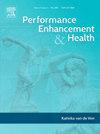Validation of the Arabic version of the performance enhancement attitude scale (PEAS)
IF 3.7
Q2 HOSPITALITY, LEISURE, SPORT & TOURISM
引用次数: 0
Abstract
Background
Doping is a significant issue among athletes worldwide, not only during competitions but even more so in the preparation phase to boost their performance. Understanding athletes' attitudes toward doping is crucial for designing interventions that support anti-doping efforts.
Objectives
This study aims at validating an Arabic version of the Performance Enhancement Attitude Scale (PEAS), thereby providing a valuable tool for further doping research in Arabic-speaking countries.
Methods
This is a cross-sectional study using a predesigned interview questionnaire to collect general characteristics data from 200 adult athletes of both sexes recruited from different sports clubs in Alexandria, Egypt. The PEAS was translated to Arabic and then back to English to ensure accuracy. The reliability of the PEAS was measured by internal consistency and split-half reliability using Cronbach's α coefficient. Construct validity was determined by factor analysis. Confirmatory factor analysis revealed an acceptable fit (X2 = 194.196, X2/df = 4.35, SRMR = 0.068, CFI = 0.92).
Results
The α coefficient for the Arabic version of the PEAS (17 items) was 0.872, indicating a high degree of internal consistency. The split-half reliability was 0.812.
Conclusions
The study results show that the Arabic version of the PEAS (17 items) is a valid and reliable instrument to assess attitudes toward doping among Arabic-speaking athletes.
阿拉伯语版绩效改进态度量表(PEAS)的验证
背景兴奋剂是全世界运动员面临的一个重大问题,不仅在比赛期间是如此,在备战阶段更是 如此,目的是为了提高成绩。本研究旨在验证阿拉伯语版的 "成绩提高态度量表"(PEAS),从而为阿拉伯语国家进一步开展兴奋剂研究提供有价值的工具。为确保准确性,PEAS 被翻译成阿拉伯语,然后再翻译成英语。PEAS 的可靠性是通过内部一致性和使用 Cronbach's α 系数的分半可靠性来测量的。结构效度是通过因子分析确定的。结果阿拉伯语版 PEAS(17 个项目)的 α 系数为 0.872,表明具有较高的内部一致性。结论研究结果表明,阿拉伯语版 PEAS(17 个项目)是评估阿拉伯语运动员对兴奋剂态度的有效而可靠的工具。
本文章由计算机程序翻译,如有差异,请以英文原文为准。
求助全文
约1分钟内获得全文
求助全文
来源期刊

Performance enhancement and health
Social Sciences-Health (social science)
CiteScore
4.70
自引率
0.00%
发文量
27
审稿时长
57 days
 求助内容:
求助内容: 应助结果提醒方式:
应助结果提醒方式:


